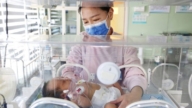【新唐人2012年12月03日讯】中共10年前的十六大报告说,不能放任社会贫富差距继续拉大,这个“豪言壮语”言犹在耳,然而10年后的今天,中国社会贫富悬殊更加严重。日前,香港媒体披露一份中共内部的秘密报告,指称中国的“基尼系数”已经突破危机的临界点,社会随时会爆发规模性动乱。请看以下报导:
国际上广泛认同和普遍采用“基尼系数”来衡量贫富差异程度,通常把0.4作为收入分配差距的“警戒线”。
由于中共当局从来没有对外正式公布中国的“基尼系数”,社会上流传的数据,基本都是由学者研究统计得出。不过中国的基尼系数早就超过0.4的警戒线,并且逐年攀升,是各界普遍认同的说法。
日前,香港《争鸣》杂志11月号文章披露了一份社会调查报告,这份题为《关于社会稳定、和谐状况调查研究》的内部报告指出,2012年上半年,中国的“基尼系数”持续上升到0.613,已经突破危机临界点,社会各种不稳定风险加剧,矛盾升温、激化,随时会爆发规模性动乱。
美国“南卡罗莱纳大学”艾肯商学院教授谢田表示,世界上贫富悬殊最大的国家是南非,基尼系数也只有0.7左右,这是由于“种族隔阂和对立”所造成的。然而在没有种族问题的情况下,中国的“基尼系数”仍然居高,令人震惊。
美“南卡罗莱纳大学”艾肯商学院教授 谢田:“最近一两年中国大陆的贫富悬殊越来越大,民众的不满情绪也越来越大,中共官员的强取豪夺、贪污腐败也越来越严重,所以这个指数突破0.6向0.7迈进也是可以预计的。”
报告还列出了多组考察调研数据,证明社会贫富悬殊已经突破危机临界点。
其中,以2011年地区党政、国家机关公职人员和当地普通职工平均年收入为例,省级(包括副省级)公职人员的平均年收入是普通职工的15倍到38倍﹔连差距最小的普通公职人员年收入也达到当地职工的6倍到12倍之多。
然而,这组统计数据还没有包括公职人员的休假旅游、物资免费派送和家属享有的待遇等其他“隐性收入”。
中国经济学家 简天伦博士:“社会动乱其实早就在两极分化的情况下,还有其他社会不公引起的民愤很大。我完全相信基尼指数的预测,可能比那更高都有可能。其实谁都知道,不需要他测都知道中国的两极分化特别严重。”
报告指出,群体规模性抗争、游行、请愿等事件,每年以20%的速度增长﹔从“反对官场腐败”、“民众权益受到侵害”,提升到还权于民、还政于民的“维权、维宪”公民运动。而这些抗争得到了社会各阶层不同程度的支持、认同和同情。
报告批评地方官员在看到本地区问题的严重性和政治危机后,产生了某种程度的忧虑和紧张,但在应对、处理过程中却抱着“再等一等、看一看”的心态,显示出缺乏承担的表现。
报告还认为,当前通过营造声势、采取“高压”手段来控制官民矛盾冲突,大陆民众对当局的期待和信任度,已经对中共政权敲响丧钟。
谢田:“不光是基尼指数所代表的经济上财富上的差距,从政治上的,社会上的,所有的指标都指向了一点,就是中共的统治会出现土崩瓦解的状态。”
《争鸣》文章也引述了北京政情分析人士的话说,所谓的“改革开放三十年”的确给中共权贵阶层带来了巨大利益,然而广大中国民众付出了辛劳后,却没有从中分享到应有的福利。“基尼系数”的警讯正显示出中共政权的岌岌可危。
采访/易如 编辑/李明飞 后制/王明宇
Riots Could Occur at Any Time: Confidential CCP Report Discloses Huge Gap between the Rich and Poor
During the Chinese Communist Party’s (CCP) 16th National
Congress ten years ago,
it was discussed that the gap between
the wealthy and the poor will be reduced.
Ten years later, and this gap has becoming increasingly stark.
Recently, Hong Kong media disclosed
an internal CCP confidential report.
It stated that China’s Gini Coefficient, a statistical
measure of inequality, has passed the critical point.
At this point, a level of rioting is expected to take
place in societ, and the CCP regime is collapsing soon.
The Gini coefficient is widely used to calibrate
the gap between the wealthy and the poor.
Usually a value of 0.4 is used as the warning
line for the gap in distribution of incomes.
However, the CCP regime has never
publicized China’s Gini coefficient.
The Gini coefficient of China that people discuss
is actually a statistical number calculated by scholars.
China’s Gini Coefficient passed the warning line
a long time ago, and it keeps increasing every year.
This fact is widely agreed in China.
Hong Kong’s “Zheng Ming” magazine published an article
in November, disclosing a social investigative report.
The article was entitled, “An Investigation
on Social Stability and Harmony”.
It stated that China’s Gini coefficient increased
to 0.613 during the first half of 2012.
This has broken through the critical point.
All kinds of social instability risk have aggravated.
Social conflicts have intensified, and
a level of turmoil can take place any time.
Xie Tian, Professor at the Aiken Business School
at the University of South Carolina, commented.
South Africa has the biggest gap between wealthy and poor.
However, the Gini Coefficient for South Africa is only 0.7,
which is mainly caused by racial antagonism.
However, there is no racial antagonism in China, and
astonishing that China has such a big Gini coefficient.
Xie Tian: “In the past one or two years, the gap between
the wealthy and poor has become bigger and bigger.
People’s discontentment keeps growing.
Corruption of CCP, and the seizing of wealth
by force, is becoming more and more rampant.
Therefore, there is no surprise that China’s
Gini coefficient is getting close to 0.7.”
报告还列出了多组考察调研数据,证明社会贫富悬殊已经突破危机临界点。
The “Zheng Ming” report listed several groups of data.
This demonstrated that the gap between the wealthy
and poor in China has broken through to a critical point.
As an example, compare the annual income for party
administration, State personnel and local ordinary workers.
The average annual income for a state official
is 15 to 38 times that of an ordinary worker.
Even the annual income of state personnel at the lowest
structure level is 6 to 12 times that of local ordinary workers.
In addition, this income data does not include
“grey income”, such as paid-time vacation, free goods and other benefits to employee families.
China Economist Jiang Tianlun: “Social riots usually take
place when the wealthy and the poor are polarized.
Other social injustices also causes great discontent.
I totally believe in the prediction on China’s Gini coefficient.
Actually, we all know that the polarization between
the rich and the poor is very severe in China.”
The report stated that all occurrences of resistance,
parades and petition have increase 20% every year.
This includes ‘anti-Corruption’ and human rights petitions.
Now it has increased in scale to citizen
movements, returning power to the people.
These movements gained support, agreement
and sympathy from people of all levels of society.
The report criticized local officials for holding the attitude
of ‘wait and see’, when dealing with local political crises.
It shows that they are lacking in responsibility.
The report also stated that the CCP now deals with conflicts
through making empty shows of strength or “high pressure".
The loss of trust and hope in the CCP regime
has already knelled its funeral bell.
Xie Tian: “Not only does the Gini Coefficient indicate
that the CCP regime is going to collapse soon.
It is also demonstrated by political, social and other indices.”
The article from “Zheng Ming” also quoted words
from analysts on Beijing’s political situation.
It stated that the so-called “30 years of reform
and opening up” did once bring huge profit to the rich, and power in the CCP structure.
However, ordinary people have obtained what
they deserve after they make the effort.
The Gini coefficient shows that the CCP regime
is in imminent danger of falling down.




























